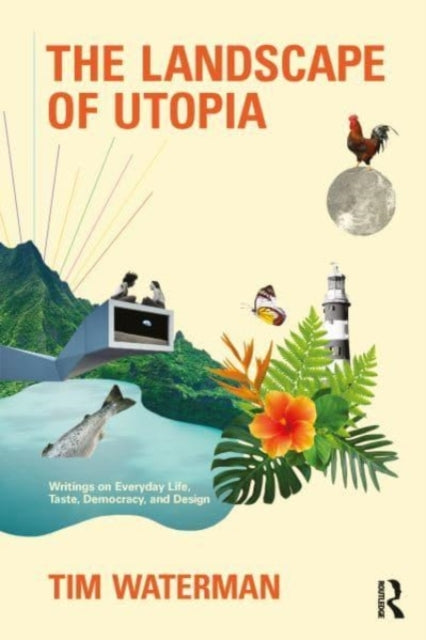TimWaterman
The Landscape of Utopia: Writings on Everyday Life, Taste, Democracy, and Design
The Landscape of Utopia: Writings on Everyday Life, Taste, Democracy, and Design
YOU SAVE £1.63
- Condition: Brand new
- UK Delivery times: Usually arrives within 2 - 3 working days
- UK Shipping: Fee starts at £2.39. Subject to product weight & dimension
Bulk ordering. Want 15 or more copies? Get a personalised quote and bigger discounts. Learn more about bulk orders.
Couldn't load pickup availability
- More about The Landscape of Utopia: Writings on Everyday Life, Taste, Democracy, and Design
Provides timely and interdisciplinary critical theory across landscape, utopian studies, environment, philosophy, and cultural studies. Written in a highly accessible, original, and engaging tone by a leading academic and theorist at the Bartlett. Illustrated with 40 black and white images interspersing the text.
Format: Paperback / softback
Length: 218 pages
Publication date: 28 February 2022
Publisher: Taylor & Francis Ltd
Rewritten text:
The Routledge Companion to Critical Theory in Landscape Architecture offers a comprehensive and timely exploration of critical theory in the field of landscape architecture, encompassing a wide range of interdisciplinary perspectives. Written by a leading academic and theorist at the Bartlett, this book is designed to be accessible, original, and engaging, making it an invaluable resource for students, scholars, and professionals alike.
Spanning across landscape, utopian studies, environment, philosophy, and cultural studies, The Routledge Companion to Critical Theory in Landscape Architecture provides a comprehensive framework for understanding the complex and multifaceted nature of the discipline. The book is organized into five distinct chapters, each dedicated to exploring different aspects of critical theory in landscape architecture.
In the first chapter, the author introduces the concept of critical theory and its relevance to landscape architecture. They explore the historical roots of critical theory and its evolution in response to social, political, and cultural changes. The chapter also highlights the key thinkers and movements that have shaped critical theory in the field, such as Marxism, post-structuralism, and feminism.
The second chapter delves into the theoretical foundations of landscape architecture, exploring the philosophical, ethical, and social dimensions of the discipline. The author examines the relationship between landscape architecture and the natural environment, as well as the role of landscape architects in shaping the built environment. They also discuss the ethical implications of designing and constructing landscapes, including issues of sustainability, social justice, and cultural heritage.
The third chapter explores the political and social dimensions of landscape architecture, examining the ways in which landscape architects can influence public policy and social change. The author discusses the role of landscape architecture in urban planning, transportation, and environmental conservation, and the ways in which it can contribute to the development of more sustainable and equitable communities.
The fourth chapter focuses on the cultural and aesthetic dimensions of landscape architecture, exploring the ways in which landscape architects can create spaces that are both visually appealing and meaningful. The author examines the role of landscape architecture in shaping cultural identity, heritage, and memory, and the ways in which it can contribute to the development of a more inclusive and diverse society.
The fifth chapter explores the future of critical theory in landscape architecture, examining the emerging trends and challenges that the field will face in the coming decades. The author discusses the role of technology, globalization, and climate change in shaping the landscape, and the ways in which landscape architects can respond to these challenges in order to create more sustainable and resilient landscapes.
Throughout the book, the author employs a highly accessible and engaging writing style, making complex theoretical concepts accessible to a wide range of readers. Illustrated with 40 black and white images interspersing the text, the book provides visual examples of the key concepts and theories discussed in each chapter.
In conclusion, The Routledge Companion to Critical Theory in Landscape Architecture is a groundbreaking and essential resource for anyone interested in the field of landscape architecture. Written by a leading academic and theorist, this book offers a comprehensive and timely exploration of critical theory in landscape architecture, encompassing a wide range of interdisciplinary perspectives. With its accessible, original, and engaging tone, this book is an invaluable resource for students, scholars, and professionals alike.
Weight: 444g
Dimension: 155 x 236 x 18 (mm)
ISBN-13: 9780367759155
This item can be found in:
UK and International shipping information
UK and International shipping information
UK Delivery and returns information:
- Delivery within 2 - 3 days when ordering in the UK.
- Shipping fee for UK customers from £2.39. Fully tracked shipping service available.
- Returns policy: Return within 30 days of receipt for full refund.
International deliveries:
Shulph Ink now ships to Australia, Belgium, Canada, France, Germany, Ireland, Italy, India, Luxembourg Saudi Arabia, Singapore, Spain, Netherlands, New Zealand, United Arab Emirates, United States of America.
- Delivery times: within 5 - 10 days for international orders.
- Shipping fee: charges vary for overseas orders. Only tracked services are available for most international orders. Some countries have untracked shipping options.
- Customs charges: If ordering to addresses outside the United Kingdom, you may or may not incur additional customs and duties fees during local delivery.


